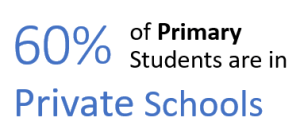Lebanon’s public education sector has grappled with numerous challenges in recent years, such as a shortage of spots in public schools, strikes by primary and secondary teachers, and various other issues. As a previous student in the public sector, STRIKE! was the most common act I encountered from my teachers. A lot of strikes and movements were organized by teachers, asking for their rights, increased wages, etc.. This was a great disabler for an efficient learning journey, where stability, the most important aspect was absent. Such a state deprived students, in one way or another, of having access to free and inclusive educational institutions/schools. For that reason, a comprehensive study I conducted revealed that a significant number of students have turned to private schools as an alternative, highlighting a critical problem in achieving the Sustainable Development Goal (SDG) of providing quality and inclusive education for all students.
. 

To address the issue of the lack of educational opportunities in public schools, which should be guaranteed by the government, as the 4th goal of SDG states, an examination of Lebanon’s education expenditure as a percentage of GDP was undertaken, where reflects the amount of money the government spends on education, in addition to another factor, which is the percentage of government’s expenditures on education as a percentage of total expenditures, These 2 metrics are then considered particularly in comparison to France, given Lebanon’s adherence to the French Educational System. The analysis of these two metrics exposed a disparity, with Lebanon’s current education expenditure as a percentage of GDP having risen since 2019 due to the economic crisis, reaching 2% in 2022, compared to France’s 6%. Although Lebanon fares well in terms of the percentage of education expenditures compared to other sectors, with a steady increase since 2014, reaching nearly 8% in 2020 in contrast to France’s 10%, the gap in GDP percentage remains concerning.
In conclusion, addressing this issue requires recommending an augmented budget for Lebanon’s educational sector. Ideally, a tripling of the budget over the next decade is proposed. This increase could be implemented gradually, but decisive action must be taken to ensure progress towards the SDG of providing quality and inclusive education for all Lebanese students.

amazing content!! really informative and relevant!